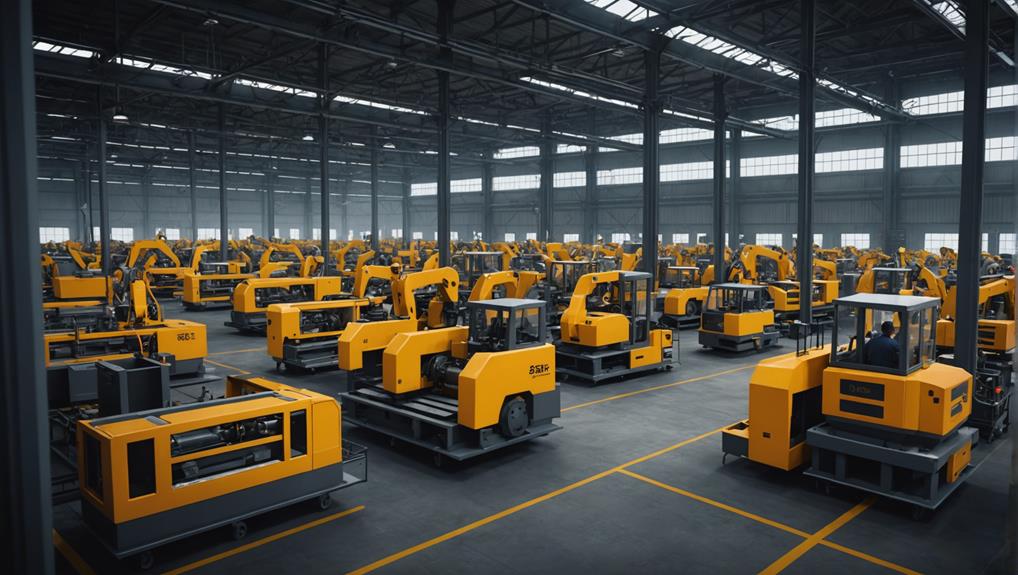Factors of Production: The Key Wealth Drivers
Factors of production, such as land, labor, capital, and entrepreneurship, are crucial for driving wealth creation and economic prosperity. Efficient resource allocation, technological advancements, wealth distribution, and ownership dynamics all play essential roles in shaping economic systems and influencing wealth accumulation. Understanding these factors is key to grasping the mechanisms behind economic growth and resource allocation. Each factor interacts uniquely to impact production efficiency and innovation, ultimately driving economic advancement. Exploring these dynamics further can offer deeper insights into the complexities of wealth creation and economic development.
Key Takeaways
- Efficiency gains from factors drive wealth accumulation.
- Incentives and resource allocation influence wealth.
- Technology enhances productivity and wealth creation.
- Ownership dynamics impact wealth distribution.
- Innovation and labor productivity drive economic growth.
Importance of Factors of Production
Factors of production play a pivotal role in the creation of goods and services, serving as the fundamental building blocks that drive economic activity and productivity. Efficiency gains are achieved through the best utilization of these factors, enhancing output without increasing input.
Resource allocation, a critical aspect of production, involves distributing these factors efficiently to maximize output. Technologies and advancements play a key role in enhancing productivity by improving the efficiency of resource allocation and utilization.
Factors Influencing Wealth Accumulation
Wealth accumulation is influenced by a myriad of interconnected economic factors that shape the financial landscape of societies. Wealth distribution plays an essential role in determining how resources are allocated within an economy. Disparities in wealth distribution can lead to inequalities, affecting the overall accumulation of wealth.
Incentives provided through the economic system also impact wealth accumulation, driving individuals and businesses to seek opportunities for growth and expansion. Resource allocation, guided by factors such as government policies and market mechanisms, influences how wealth is generated and distributed.
Addressing issues of inequality in resource distribution is essential for sustainable wealth accumulation, ensuring a more equitable economic environment for all members of society.
Role of Technology in Production
Technology plays a pivotal role in shaping the efficiency and productivity of production processes across various industries. Technological advancements have greatly impacted production efficiency, leading to improved output and reduced costs. Innovations in automation, artificial intelligence, and data analytics have revolutionized how goods and services are produced, enhancing speed and accuracy. The integration of technology in production processes has enabled companies to streamline operations, optimize resource utilization, and meet consumer demands more effectively. Below is a table highlighting the influence of technology on production efficiency:
| Technological Advancements | Impact on Production Efficiency | Examples |
|---|---|---|
| Automation | Increases speed and accuracy | Robotics |
| Artificial Intelligence | Enhances decision-making processes | Machine learning |
| Data Analytics | Optimizes resource allocation | Big data analysis |
Ownership Dynamics in Economic Systems
In economic systems, the distribution of ownership plays a crucial role in shaping the structure and functioning of societies. Ownership dynamics vary across different economic systems, with private ownership predominant in capitalist economies. In capitalism, individuals, businesses, and investors typically control factors of production, leading to diverse ownership patterns.
Conversely, in socialist systems, the government often holds more control over factors of production, especially in key industries. Communist economies lean towards complete government ownership of factors of production. The balance between government control and private ownership greatly impacts resource allocation, innovation, and overall economic performance.
Understanding the nuances of ownership dynamics is essential for comprehending the underlying mechanisms that drive economic systems forward.
Impact of Factors on Economic Growth
Essentially, the contribution of factors of production to economic growth is a fundamental aspect of understanding the dynamics of an economy. Innovation impact and labor productivity play pivotal roles in shaping the growth trajectory of nations. Innovation impacts the efficiency and quality of production processes, leading to advancements in goods and services.
Technological progress enhances labor productivity by enabling workers to produce more output in less time. This increased efficiency directly influences economic growth by boosting overall productivity levels. Essentially, the synergy between innovation impact and labor productivity fosters a conducive environment for economic advancement, driving prosperity and competitiveness in the global marketplace.
Understanding how these factors interplay is essential for policymakers and businesses seeking sustainable growth strategies.
Conclusion
To sum up, the factors of production serve as the essential drivers of wealth creation and economic prosperity. Through the interplay of land, labor, entrepreneurship, and capital, these factors shape economic systems and influence wealth accumulation.
As technology continues to advance, the role of these factors in production efficiency and economic growth becomes increasingly significant. By understanding and harnessing the power of these key wealth drivers, societies can work towards sustainable economic development and prosperity.







